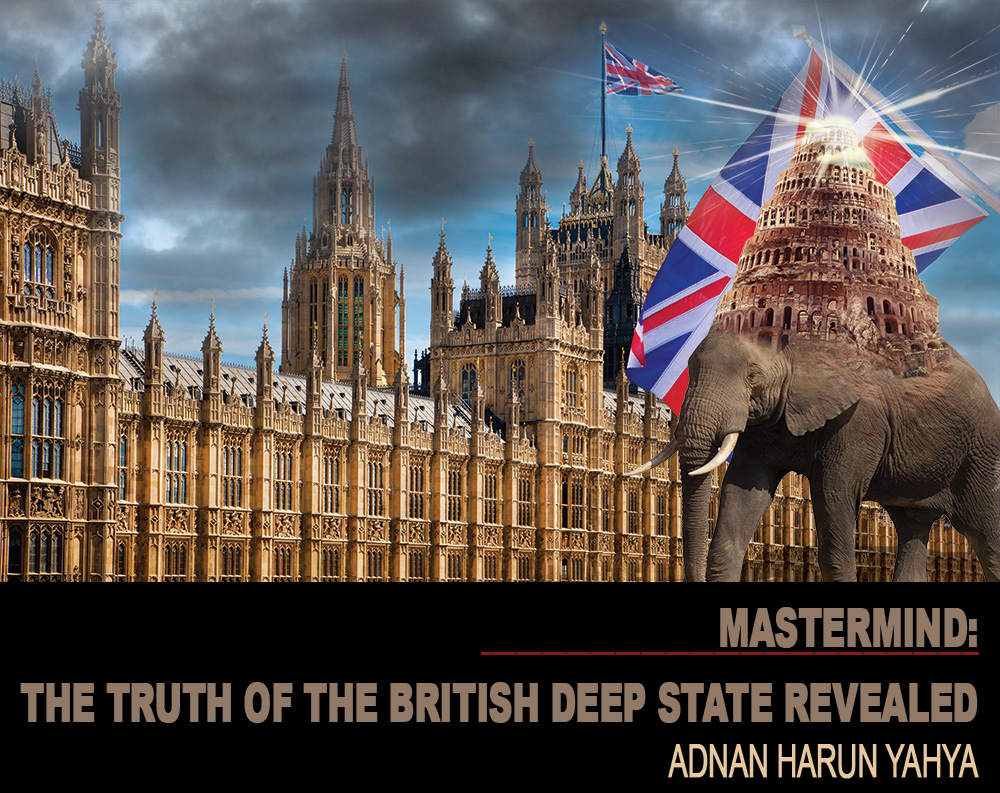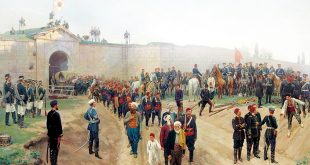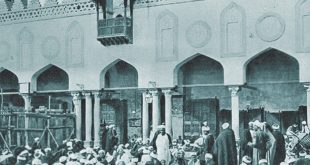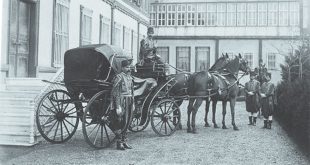The concessions granted to the British and pro-British administrations came with a blind trust in the British, not only in trade, but also in politics and military matters as well. It was explained in previous pages how the British deep state approached other countries and leaders under a friendly disguise. This tactic became very dominant, especially in the late Ottoman period. Primed by the British deep state, Ottoman administrations declared wars, signed treaties detrimental to the Empire and brought members of the British deep state to important positions. Indeed, particularly in the last period of the Ottoman Empire, the army and the navy were entrusted mostly to British pashas, as another sign of this reckless attitude.
Many British officers were given important positions in the second half of the 19th century while most achieved the rank of ‘pasha’. Most them, under the pretense of ‘modernizing the army and training the soldiers’, played active roles in Ottoman failure in many wars. The officers who were supposed to serve the Ottoman army were in fact nothing other than the agents of the British deep state.
The British Officers of the Ottoman
Hobart Pasha
 |
| Augustus Charles Hobart-Hampden |
Augustus Charles Hobart-Hampden, widely known as Hobart Pasha, was a naval captain who served in the Royal Navy. He worked as a midshipman in Brazil. Upon retirement, he joined the American Civil War and commanded a blockade runner, which conveyed British weapons to the South in exchange for cheap cotton. After the American Civil War, he joined the Ottoman army and was made rear-admiral.
Hobart Pasha was in charge of the Ottoman navy during the Russo-Turkish war (1877-78). During the conflict, the only position from which the Ottomans could block a Russian ground attack was the Danube River in Romania. The Ottoman navy was perfectly capable of preventing the Russian army’s passage through the Siret River. However, Turkish ships under the command of Hobart Pasha, arrived too late to gain control of the river. Four to five days had already passed before four vessels could reach the critical points, allowing the Russian army to easily cross the river. The Ottoman army, which was on the verge of gaining control of the Balkans after defeating the Serbian and Montenegro armies, was stabbed in the back. From that point on, there was nothing that could stop the Russian navy from coming as far as Yeşilköy in Istanbul.
The Ottoman navy under Hobart Pasha’s command was, in fact, a more powerful army than that of the Russians, but strangely wasn’t used to defend the Balkans. Hobart Pasha sent the vessels from the western Black Sea to the Caucasus and left the ground troops in the Balkans without support. At the end of the war, the Ottomans had to cede both the Balkans and the Caucasus.
Vere Henry Hobart, Lord Hobart, who was the older brother of Hobart Pasha, was at the time the director-general of the Ottoman Bank. He later started working in the Ottoman Public Debt Administration that brought about the bankruptcy of the Empire.
Arnold Burrowes Kemball
 |
 |
| Arnold Burrowes Kemball | Valentine Baker |
During the Russo-Turkish war, Abdülkerim Nadir Pasha headed the Balkan forces of the Ottoman army. After the Russians passed the Danube River without incident, they advanced on Svishtov and Nikopol and easily won two battles. Since the main Balkan forces couldn’t get to the region in time, the Turkish forces proved insufficient and in a matter of one week, two battles were lost.
British general Arnold Kemball was a part of the general staff of Abdülkerim Pasha. Kemball had previously fought against Muslims during the Afghan wars with the British army.
Valentine Baker or Baker Pasha
Valentine Baker was a felon that received a dishonorable discharge from the British army for rape. During the Russo-Turkish war, he served in the Ottoman army as a Brigadier General in Mehmet Ali Pasha’s staff. Mehmet Ali Pasha, on the other hand, was a German who had converted to Islam and become an Ottoman citizen. His real name was Ludwig Karl Friedrich Detroit. The units commanded by Baker Pasha withdrew from the Tashkessen village, leaving even the injured behind in their fear. Bulgarian villagers killed all the remaining survivors. After that, Baker Pasha sent back some of his troops and set ablaze all the villages in the vicinity.
After this war, he returned to the British army and took over the newly established police force in Egypt and began to train their gendarme units.
Douglas Gamble and Hugh Pigot Williams
 |
| Hugh Pigot Williams |
Five years before WWI, Douglas Gamble was hired as an advisor for the Ottoman navy and made the head of the 6th fleet under the pretense of ‘reforming the fleet’. Gamble was also a former British navy intelligence officer. Unsurprisingly, when he returned to his homeland one year later, he fought with the British against the Turks.
British admiral Hugh Pigot Williams replaced Gamble as an advisor, and served in this position eight months before returning to his country. The next time he came back to Ottoman waters, he was the captain of the British battleship Irresistable in the Gallipoli campaign. In other words, right before WWI, the Ottoman navy had been entrusted to two British officers, who would soon turn against and fight the Ottomans.
Adolphus Slade or the Mushaver Pasha
After serving thirty years in the Royal Navy, Adolphus Slade joined the Ottoman navy as an admiral. Renamed ‘Mushaver’ (meaning ‘consulting’), Slade was intricately involved in the Ottoman maritime force. When the Russians burnt the Ottoman fleet in Sinop during the Crimean War and sank twelve Ottoman ships, the only surviving ship was the one carrying Slade. As the Turkish fleet was being attacked, her so-called allies at the time, the French and British ships stationed in the Bosphorus, just watched.
In his memoir, Slade displayed the shocking hatred he harbored for Turks and Muslims (Turkish nation and Islamic world are above his remarks). He claimed that all Ottoman constituents, Muslim and non-Muslim alike, shared a common trait despite their differences and that was ‘a total want of conscience’ and continued, “A pasha slays his confiding guest; a kadi bastinadoes an innocent man; a banker cheats his patron; a servant robs his master; —all swearing on the Koran, or on the Talmud, or on the Testament, to their respective faith…”170
… nowhere, perhaps, has corruption in Turkey been more hideously displayed than in the Mekhemés, (courts of law,) where justice is sold to the highest bidder, and witnesses stand, almost within sight and sound of the mollah’s cushions, ready with their stock in trade—their consciences.171
Three English line of battle ships and as many frigates, would prove an overmatch for it [the Ottoman naval force].172
 |
| Baldwin Walker |
Baldwin Wake Walker (Yavir Pasha) and Traitor Ahmet Fevzi Pasha
British Baldwin Wake Walker, or Yavir Pasha, joined the Ottoman navy in 1838 and served for seven years. In 1840, Ahmet Fevzi Pasha, using an insignificant incident as an excuse, handed over the fleet under his command to Muhammad Ali of Egypt, who had previously rebelled against the Ottoman Empire. For this reason, he has gone down in history as the ‘Traitor Ahmet Fevzi Pasha’. While the navy ships were anchored in Alexandria, Yavir Pasha, or Baldwin Walker, claimed that if he laid a siege on Egypt with the entire Ottoman navy, he could get back the ships. His true intentions were to make the Ottoman ships fight each other to weaken them in the process. However, the crisis came to an end when Muhammad Ali of Egypt agreed to return the ships on his own volition. It must be noted that Yavir Pasha had for years worked as the advisor of Traitor Ahmet Fevzi Pasha.
 |
| Felix Woods |
Henry Felix Woods or Woods Pasha
British Henry Felix Woods, also known as Woods Pasha, served more than 40 years in the Ottoman navy, most of it under Abdul Hamid II’s reign. Woods was the main reason why the Ottoman navy completely rotted away during Abdul Hamid II’s reign in the Golden Horn, despite the fact that it had been recently rebuilt under Sultan Abdülaziz’s orders. According to the British Naval Forces policy, a British officer could not occupy a position for more than two years in a foreign country, but Woods spent 42 years in the Ottoman navy.
Engineers, captains and other technicians that Woods Pasha transferred for large sums, deliberately refrained from teaching their skills to the Turkish personnel and ensured that the true control was always with the British. As Woods described it in his memoir, Turkish mechanics, despite having worked for years, couldn’t become head mechanics because British mechanics blocked their way to ascension. Particularly, the British mechanics enjoyed special privileges with respect to their duties.173
Woods Pasha was also a negotiator between key figures at the capital and Sultan Abdul Hamid II. He took special care to introduce British journalists to the Sultan and secretly provided intelligence to the British regarding the Sultan and the administration.174
The Battle of Navarino |
| The Battle of Navarino is known as one of the most ruthless naval fights in history. Led by the British deep state, the British, French and Russian navies launched a full-fledged attack on the Turkish fleet anchored at Navarino, located to the south of Greece. Muhammad Ali of Egypt also sent a fleet from Egypt to aid the Ottomans, which were at the time trying to suppress the Greek riot that was also instigated by the British deep state. There wasn’t an official declaration of war; instead the allied naval forces of Britain, France and Russia suddenly began firing at the Turkish ships. Caught off-guard, 70 ships sank and more than 3,000 sailors were martyred. In a matter of three hours, the Gulf of Navarino became a bloodbath. One very important element in the battle was the presence of British and French sailors in the Turkish fleet. One day prior to the raid, French sailors in the fleet of Muhammad Ali of Egypt, fighting for the Ottomans, and British sailors in the Ottoman fleet switched sides. Not only did they desert their posts but they also deprived the Ottomans of important captaincy skills, because during that time, this important duty was given only to the people of the British deep state. |
 |
The British Deep State and the Caliphate |
| At the onset of the 17th century, many European states decided to follow in the footsteps of Portugal and Spain and began pursuing their own imperialistic desires. Britain proved the most ambitious.
The readers will recall how Britain had already set up East India Co. in the 1600s as the first step towards British imperialism. The company first directed its attention to the Indian subcontinent and established numerous trading posts across the region. After expanding rapidly, it began to build colonies before eventually taking control of territories. By the 19th century, Spain and Portugal had begun to lose their colonies and entered their respective eras of decline. This meant that the South American countries, once colonies of Spain and Portugal, were now independent, but also available to British aspirations as open markets. In the meantime, having successfully completed the Napoleonic Wars in Europe (1800-1815), the British had gained new lands in the East. Now, securing the main route to India –the jewel in the crown– was the top priority on the British imperialistic agenda. When the French completed the Suez Canal in 1869, the road to India became even shorter but its security became an even more sensitive issue. Britain had begun to build spheres of influence along the Red Sea and Arabian shores despite Ottoman protests. Furthermore, by promising to supply weapons to the Ottoman Empire should Russia obtain control of East Anatolia, Britain gained control of Cyprus in 1878, which was a strategically important island much like Gibraltar Strait or Malta. Similar methods were used by the same deep organization to gain control of areas in the Far East. All these developments turned Britain into a massive empire with colonies all around the world, where millions of Muslims were living, making the control of this population a critical point for Britain. However, there was a problem: those Muslims, due to their Islamic identity, were loyal to the Ottoman Caliph, who was the spiritual and political leader of the world’s Muslims. He had the power to bring millions of Muslims together within a strong alliance with just one word. For this reason, the biggest threat to the British deep state in its quest of gaining control over Muslim lands was the Ottoman Empire and the Caliph. |
British Deep State Provokes Arabs against the Caliph |
| Muslims all around the world deeply revered the Ottoman Sultan, who was their caliph. In the beginning, the British deep state sought to use this loyalty to its advantage. For instance, in a conflict with the Kingdom of Mysore in South India, Britain asked Ottoman Sultan Selim III to write a letter to Tipu Sultan of the Kingdom of Mysore to advise him to not fight the British.1 Selim III indeed wrote this letter in 1798.
When wide-scaled riots broke out in India in 1857 against British occupation, Britain once again asked for the help of the Sultan. At the same time, this impressive influence of the Caliphate was worrying the British deep state. What if the circumstances changed, and the religious and political influence of the Caliphate became a threat to Britain? For this reason, they came up with a multi-layered caliphate policy, which would involve gradual undermining of the Caliphate’s authority among the Muslim population living under British rule. George Percy Badger, an adviser to the British Foreign Secretary, prepared a report in January 1873 on the Ottoman Caliph. He claimed that since the Prophet Muhammad (pbuh) was an Arab, the caliphate had to be an Arabic institution. However, Ottoman sultans were viewed and revered especially by Asian Muslims as the true caliph. Using the ‘ethnicity’ card as a deception, the British deep state sought to rally Arab Muslims against the Ottoman Empire. According to their deep plans, this tactic would prevent Arabs from recognizing Ottoman sultans as their caliph and thus diminish the influence of Ottoman caliphs in the Islamic world.2 Five months after this report was penned, the Foreign Office instructed all the British consuls in Asia to investigate the religious and political developments in the Muslim world.3 In other words, Britain began its efforts to turn sixty million Muslims living under British rule against the Ottomans and the Caliph. Wilfrid Scawen Blunt, a diplomat of the British Foreign Office, was known as an expert on Arabs and the Middle East. As one of the prominent supporters of the Arab independence movement during his visits to the region, Blunt devised plans to break off the Arabs from the Ottoman Empire. In his book The Future of Islam, he made serious accusations against the Ottoman Caliphate: … that the House of Othman has been and is the curse of Islam, and that its end is at hand. … They know that as long as there is an Ottoman Caliph, whether his name be Abd el Aziz or Abd el Hamid, moral progress is impossible, that the ijtahad cannot be re-opened … Abd el Hamid’s rule is neither juster nor more in accordance with the Mussulman law than that of his predecessors. … A return, therefore, to Medina or Mecca is the probable future of the Caliphate.4 Blunt also claimed that the culprit behind the backward state of the Arabs, who had built great civilizations in the past, was the Ottoman Empire. He believed that Britain was now an empire with millions of Muslim constituents and that instead of supporting a caliphate sitting in Istanbul, it would be more strategic and logical for Britain to invest in an Arab caliph that is under British control and who could be easily manipulated. He was convinced that if independent Arab kingdoms were set up and the Caliphate was transferred to Mecca, Ottoman control in the region could come to an end. Graat, the British Foreign Secretary for India, in his letter to Kitchener, the British Consul-General in Egypt, revealed the kind of Arab state the British deep state wished to see: Britain never desires to see a powerful Arabic Caliphate. We don’t want a united Arab state. Arabs must be in a fragmented, weakened situation. If they become emirates under our control, as small as possible, they shall have little resistance to British, but will still serve as a buffer zone against other big countries of the West.5 Another Western source reveals the status the British planned for the Arabs and Caliphate during WWI: Sticking to their old policies of creating division and dissension to maintain their control easily, the British never wanted a united and powerful [Arab] empire, no matter what the consequences, because the ruler of such an empire would want to remain independent. The British instead wishes political unions made up of smaller states, which would require British arbitration in case of disagreements. British also didn’t have any intentions of giving up on their sovereignty claims over the governorates of Kuwait, Bahrain, Muscat, Hadhramaut in favor of a big Arab empire. On the other hand, caliphate was a sensitive issue for Britain as it had to take into consideration the sentiments of Indian Muslims. Indian Muslims, however, tended to side with Turks, rather than the Arabs. They wanted to remain loyal to the Caliph in Istanbul.6 In the end, the Arab world of 100 million people divided into sixteen separate countries was fraught with conflicts. The only winner was the British deep state. Throughout the end of the 1800s and early 1900s, the main policy of the British deep state has been fragmenting the Arab world and breaking them apart both from the Ottoman Empire and each other. As the following pages will be covering in more detail, the British deep state has made numerous attempts during and after WWI to make those ambitions come true. Through their spies disguised as ‘archeologists’ such as Gertrude Bell, and Lawrence of Arabia, they carried out this policy and provoked Arab tribes against the Ottoman Empire, sometimes offering incentives in form of money and weapons. Homosexual British spy Lawrence of Arabia explained this fake victory that he achieved by pitting communities against each other, saying that he created an Arab ‘brown dominion’ within the British Empire by rallying Arabs and making them rebel against the Turks.7 Clearly, the true aim has never been an Arab independence or a big Arab state, because Arabs were always considered by the British deep state as their colony. Regrettably, the same state of mind still prevails and the insidious colonial ambitions of the British deep state regarding the Arab countries are still underway. However, it must be remembered that the British deep state failed in its plots against the Caliphate. No matter what it did, the last stop of the Caliphate remained in the Ottoman Empire and when the Empire collapsed, the Caliphate hadn’t been abolished. On the contrary, instead of vesting the power in a single person, the Caliphate was entrusted to the Republic and the title is still waiting for its true owner. Mustafa Kemal Atatürk knew very well that in the End Times, the Mahdi (pbuh) would appear and take over as the spiritual leader of Muslims at a time of intense conflicts. Mustafa Kemal built the Republic regime and its institutions based on this knowledge. We know from the hadiths of the Prophet Muhammad (pbuh) that the Mahdi (pbuh) will appear in Istanbul in the current era, put an end to the wars, terror and conflicts and bring true peace and love to the world. |
| 1. Azmi Özcan, “İngiltere’de Hilafet Tartışmaları 1873 – 1909”, İslam Araştırmaları Dergisi (Journal of Islamic Research), Issue 2, 1998, p. 49
2. Memo by G. P. Badger, “Respecting Turkey and Russia in Their Relations with Arabia and Central Asia”, enc. to Frere to Granville, 26.11.1873, F. O, 424/32 3. Azmi Özcan, Pan-Islamism, Indian Muslims, the Ottomans & Britain (1877-1924), Leiden: Brill, 1997, p. 40 4. Wilfrid Scawen Blunt, The Future of Islam, The Project Gutenberg EBook, 2005, pp. 55, 62 5. Süleyman Kocabaş, Osmanlı İsyanlarında Yabancı Parmağı, Bir İmparatorluk Nasıl Parçalandı?, (Foreign Intrusion in Ottoman Riots, How An Empire Was Dismembered), Vatan Yayınları, October 1992, p. 96 6. Ibid., pp. 96-97 7. Ibid., p. 102 |
Footnotes:
170. Adolphus Slade, Records of Travels is Turkey, Greece, &c., 2009, p. 312
171. Adolphus Slade, Turkey, Greece, and Malta: Volume 1, Adamant Media Corp., 2003, p. 208
172. Adolphus Slade, Turkey, Greece, and Malta: Volume 2, Adamant Media Corp., 2003, p. 15
173. Sadık Ilgaz, “Osmanlı Donanması’na Dair İki İlginç Anekdot” [Two Interesting Anecdotes on Ottoman Navy], İlim Dünyası, 2012, http://www.ilimdunyasi.com/dun-bugun-yarin/osmanli-donanmasi8217na-dair-iki-ilginc-anekdot/?imode
174. Fatih Erbaş, “Osmanlı Donanmasında Yabancı Müşavirler” [Foreign Advisors in Ottoman Navy], Academia, https://www.academia.edu/13440260/OSMANLI_DONANMASINDA_YABANCI_M%C3%9C%C5%9EAV%C4%B0RLER
 British Deep State MASTERMIND: THE TRUTH OF THE BRITISH DEEP STATE REVEALED
British Deep State MASTERMIND: THE TRUTH OF THE BRITISH DEEP STATE REVEALED



